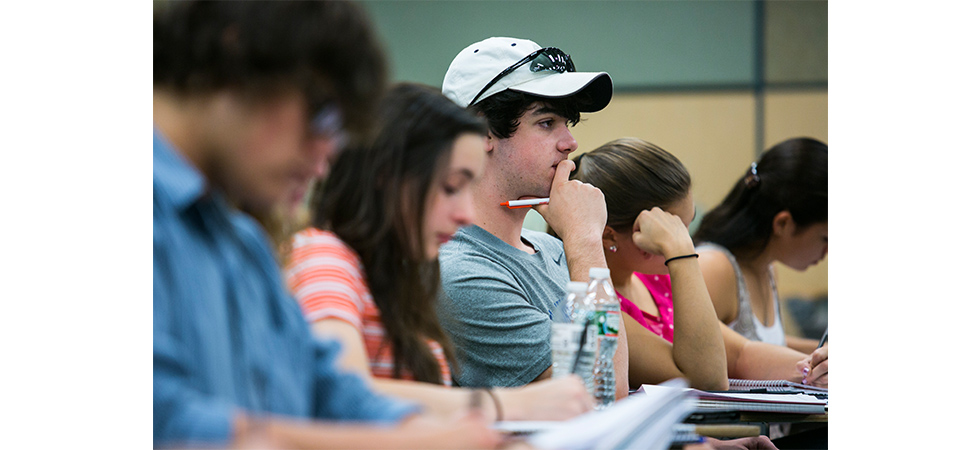Assumption Introduces Sophomore-focused Initiative

Assumption has launched a special initiative for sophomores that will encourage them to find a deeper connection between their spiritual and religious commitments and their personal and professional lives.
SOPHIA (SOPHomore Initiative at Assumption) was introduced in December to the 600 members of Assumption’s Class of 2016, and officially launched in fall 2013. Interested students must apply to participate, and 24 students will be accepted. These 24 will comprise the program’s “Collegian” group.
Although there are many programs designed for first-year and sophomore students, SOPHIA uniquely combines residential, academic, grant, and travel opportunities and the guidance of four dedicated faculty mentors. SOPHIA’s mission is to foster a culture of vocational exploration at Assumption to help students discern and choose lives of meaning.
The program’s success will rely on students’ commitment to discover their personal, professional and spiritual goals in light of their talents and desires and the needs of the world, according to Catherine WoodBrooks, Ph.D., Assumption’s vice president for student affairs, who proposed the initiative with Neil Castronovo, Ph.D., dean of student development; and Louise Carroll-Keeley, Ph.D., associate provost, and Fr. Dennis Gallagher, A.A., vice president of mission at Assumption.
“We believe sophomores can greatly benefit from a program that allows them to deepen their appreciation of the complexity of the world and the divine reality sustaining it,” WoodBrooks explained. “SOPHIA is designed to help students develop their own understanding of their lives through vocational practices. It will also foster the culture of professional exploration as vocational exploration, which enhances the educational mission of the Augustinians of the Assumption.”
The program focuses on sophomores because these students typically have some academic flexibility. Juniors and seniors are busy fulfilling the requirements of their majors, and first-year students are immersed in adjusting to college life. According to Carroll-Keeley, sophomores can continue completing core requirements, while simultaneously searching for a career and spiritual path.
“The students will be able to do this with the help of a faculty mentor and like-minded students living in the same residence hall, which will provide a reflective and engaged community,” she said.
In addition, SOPHIA students will participate in co-curricular activities and special courses specifically designed for the initiative. The first course, in philosophy, is “Living Lives that Matter,” will be offered during the fall 2013 semester. An optional “Augustine Seminar” will be offered in spring 2014.
Along with the new courses, a two-day, off-campus retreat overseen by Fr. Gallagher will give Collegians a chance to reflect on their personal and professional lives in terms of their vocation. Collegians will also be invited to compete for three summer grants in the areas of faith, the life of the mind, and ¬community engagement. This program complements the vocational programming Assumption already offers through the institution’s Reach Out Center and Office of Campus Ministry.
The capstone experience “ROME SOPHIA” will be an optional component of the students’ vocational journey. Students may choose to travel to Rome, Italy, for two weeks to focus on community, reflection and mentoring. The first trip will be in May 2014.
Faculty and staff will also be given the opportunity to take part in vocational learning in May 2013. A reading seminar, “Literature of Vocation,” will culminate in a two-day workshop to provide a hands-on experience in preparing to mentor Collegians.
To support SOPHIA and create the new courses, Carroll-Keeley, Castronovo and WoodBrooks successfully applied for a grant administered through the Washington, D.C.-based Council of Independent Colleges and Lilly Endowment Inc. The grant also will help future Collegians form a connection with those who took part in the inaugural program. A Book of Common Readings will be created to serve future Collegians in their vocational quests. Future students will be able to seek guidance from those who have previously completed the program and learn from their knowledge and experience.
